
Is
this the world's largest insect? Anthony the giant 'Bulldog' ant is seen
here at the entrance to the Museum, with a young volunteer (Miss Ocean)
helper - who actually worked on the cart that Anthony sits on. 'Miss
Ocean' is a conservationist, keen on the country and rewilding, who also
hates ocean
plastic. But loves the humpback whales &
dolphins
that are forced to swim in our marine litter.
The use of fossil fuels to power our economy
creates more greenhouse
gases than the planet can absorb. They have served their purpose for
developed nations, where alternative energy as renewables, mainly wind
and solar
panels, can provide emission free energy, heating and transport. In
recognition of our reliance on diesel,
oil, petroleum
and natural
gas, and general apathy in terms of reductions, most nations
declared a Climate Emergency.
Herstmonceux
Museum hosts an Innovation Hub, almost all of which exhibits
concern solar and electric vehicles. This is our contribution towards
Net Zero, in showing visitors how it is possible to think outside the
box, with the aim of inspiring climate engineers and entrepreneurs of
the future. Maybe even to inspire councillors and politicians yet to be
elected, that climate innovation should be nurtured and encouraged, with
demonstrable results in the form of three full size vehicles on display
with cartridge exchange (instant) refueling for BEVs and HFCEVs. This,
despite the innovator not receiving any kind of support from local
authorities. Imagine then the possibilities if future innovators are
supported. There is even a model of a hydrogen
truck refuelling station, derived from the cartridge based system,
named SmartNet™.
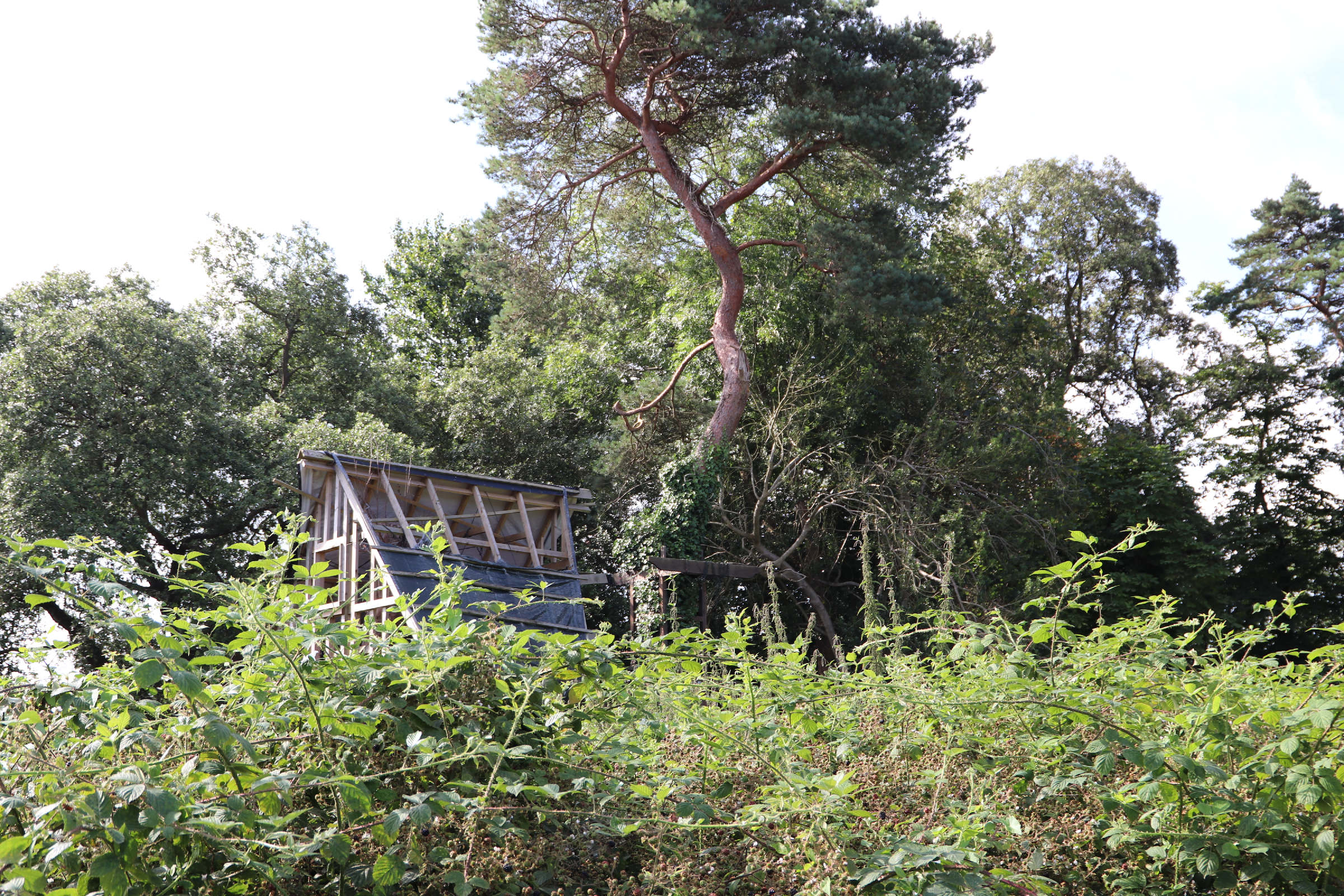
BLENDING
IN - This roof started out as a legal requirement under Health
& Safety Regulations. Since there is a requirement to protect
visitors to the museum and workers, from falling
branches and trees. That unfortunately, the Scots Pine species is
prone to. The Scots pine (Pinus sylvestris) is an evergreen conifer native to northern Europe. Mature trees grow to 35m and can live for up to 700 years. The bark is a scaly orange-brown, which develops plates and fissures with age. Twigs are green-brown and hairless.
Apart from falling branches, in high winds branches blown from adjacent
trees can be very dangerous. At present, the Museum has no beneficial
use to help pay for the upkeep of this important heritage asset. What is
at present protection for those working underneath, could well evolve
into an attraction
that generates an income for the Museum.
WEALDEN'S
CLIMATE EMERGENCY DECLARATION
In
July of 2019, the local authority declared a climate emergency. Yet,
conventional executive house building in carbon unfriendly materials has
actually accelerated to unprecedented levels. Running counter to such
proposition. Leading one to believe the declaration is superficial
greenwashing. Especially so, where in the council's car park there are
only 2 EV recharging points for all visitors and council staff. And we
have two charging points at the Museum for one admin staff and one
volunteer maintenance man. Who then is leading the climate emergency
charge?
It
is all very well "talking the talk," but when it comes to
"walking the talk," it appears our local authority are
struggling to come to terms with their own policies. Making all the
right noises is vastly different from doing all one can too make it
happen. One of the first things being an infrastructure for electric
vehicles. The requirement to "change"
practices from "Business as Usual."
Wealden
District Council (WDC) claim action on Climate Change is not new to
them. According to their website they have been taking action to address, mitigate, and adapt to Climate Change for a number of years. Though
noticeable not in the area of housing.
They concentrated on their offices in Hailsham during a 2011 renovation to sustainability standards, achieving a BREEAM ‘Excellent’ rating. This included an energy efficient retrofit. The offices
benefit from air source heat pumps, solar photovoltaic (PV) energy generation, passive ventilation, solar shading, cycle storage, and dedicated car-share bays. Alas no charging points to encourage EVs.
Hence, WDC undestand what to aim for. But the same ethos has not flowed over to low cost housing. Commonly called "Affordable" or "Sustainable" housing. One of the most obvious ways of reducing the carbon footprint for Wealdens's geographical administrative area. And a marked lack of cooperation with Eastbourne and Lewes council's according to
Inspector Louise Nurser in 2019.
"I am sorry to have to tell you that the submitted plan cannot be taken forward to adoption because it has failed one of the requirements for legal compliance, that of the Duty to Co-operate
(DtC). In addition, there are some significant failings in respect of the soundness of the submitted Plan."
Inspector: Louise Nurser BA(Hons) Dip UP MRTPI
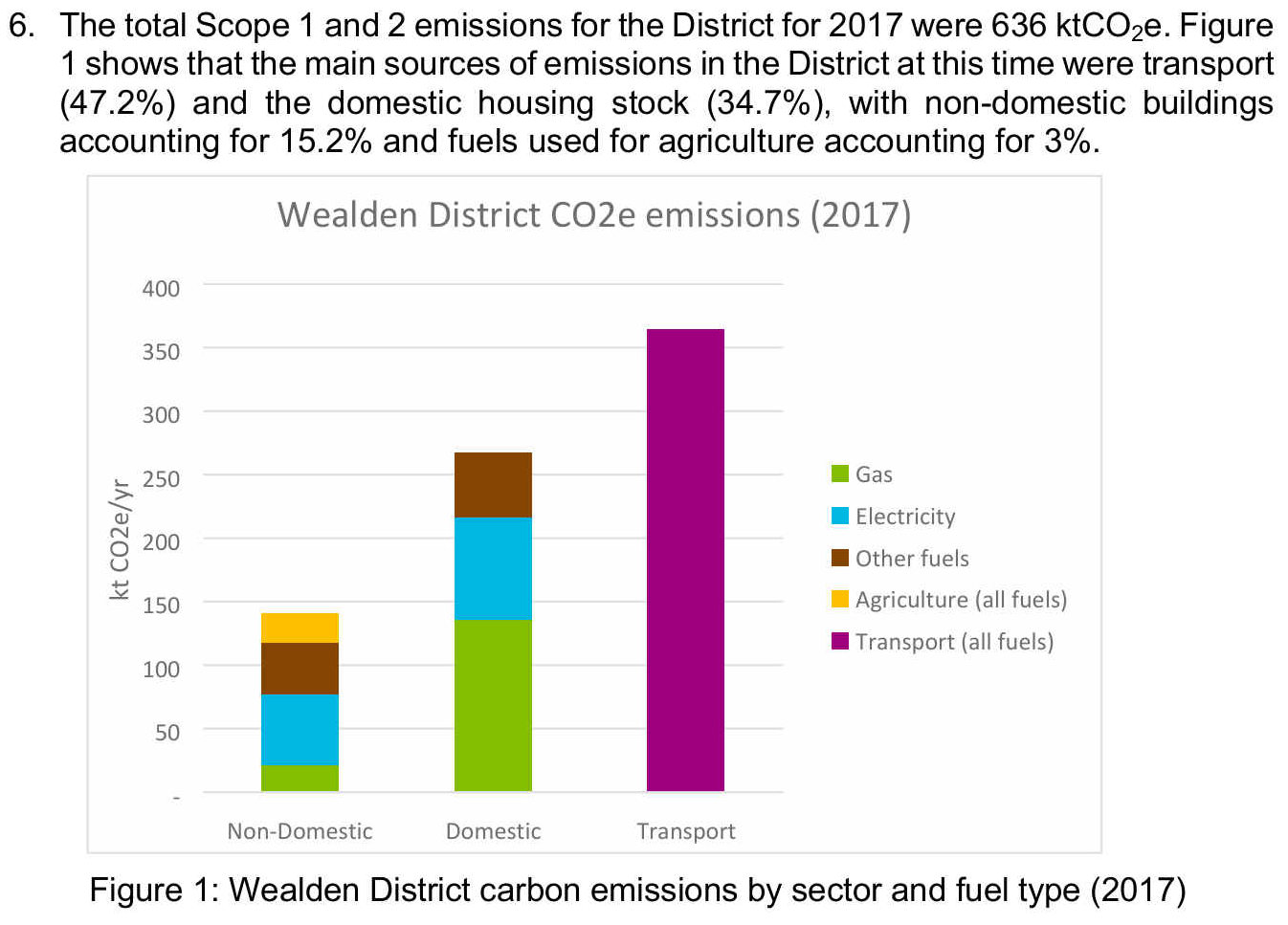
The total Scope 1 and 2 emissions for the District for 2017 were 636 ktCO2e. Figure
1 shows that the main sources of emissions in the District at this time were transport
(47.2%) and the domestic housing stock (34.7%), with non-domestic buildings
accounting for 15.2% and fuels used for agriculture accounting for 3%.
WDC
declared a Climate Emergency in July 2019 and made a commitment to pursue efforts to reduce emissions for the council, and for the district to be net zero by 2050 (or before).
Then embarked on a spree of consents for executive house builds, in
denial of the evidence in their own Report to Committee.
WDC claim that following the declaration, a Climate Emergency Plan was prepared, setting out 43 actions Wealden District Council could take to meet its targets. Cabinet adopted the Climate Emergency Plan and prioritised 23 actions in December 2019. As noted, this did not include 'Sustainable Housing.'
With not a lot on transport either, to wit the complete absence of
street charging points in towns in their district.
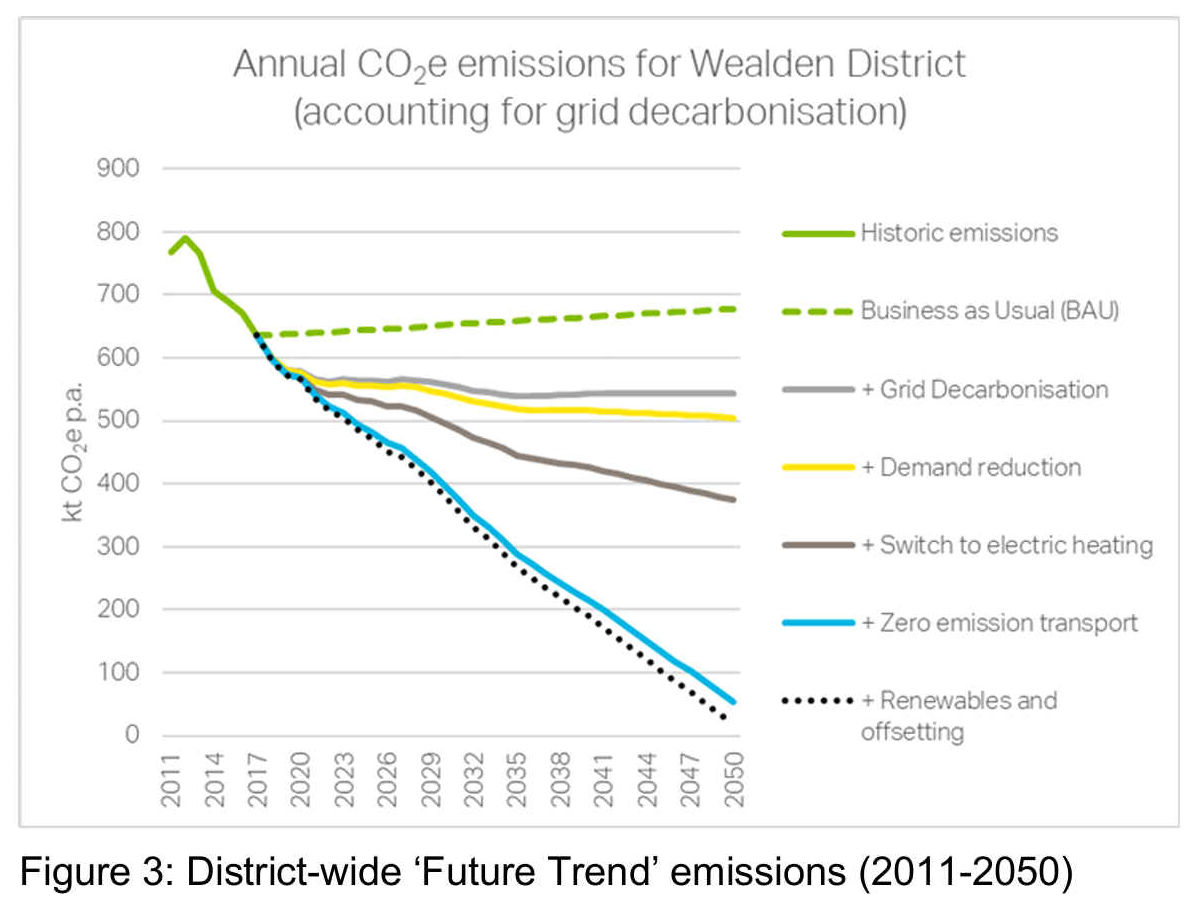
FIGURE
3 - A graph from Wealden's Report, more or less confirming that with
their present performance, in not assisting the transition to to Zero
Emission Transport, that they are not going to make it. I.e. not comply
with the Climate
Change Act 2008. Under a ‘business as usual’ scenario (i.e. without interventions), emissions will increase slightly as a
result of forecast growth.
They are said to be currently developing their new Climate Change Strategy and Action
Plan, five years on from declaring an "Emergency" situation -
though it is hard to detect any sense of urgency - as per Greta
Thunberg's message to the United Nations. This is likely to be adopted by the council in autumn 2024 and will outline their net zero road map. The portfolio holder
was Roy
Galley, (Conservative) ousted in the 2023 local elections.
WDC's
ROUTES TO DECARBONISATION
8. In order to achieve a net-zero carbon target by 2050 (for both the District and the
Council), substantial changes will be required at a national level and across all
sectors. The changes required nationally are largely reflected in the local picture
and fall into a number of broad categories:
a. National grid decarbonisation
b. Demand reduction (energy efficiency measures & behaviour change)
c. Switch to electric heating
d. Switch to zero emission transport
e. Carbon offsetting through renewable energy generation
f. Carbon offsetting through sequestration
Again,
what is missing is housing, that all council's appreciate constitutes
34.7% of CO2 in their districts. Hence, it is "business as
usual." These UK "Declarations" are said by many to be a
ruse, hoping that other nations will keep their word, to offset their
delinquency.
The
one glimmer of hope is Prime Minister, Keir Starmer's move to compete
with the Grid that Margaret Thatcher sold off. That is a major log-jam
in the fight against global warming.
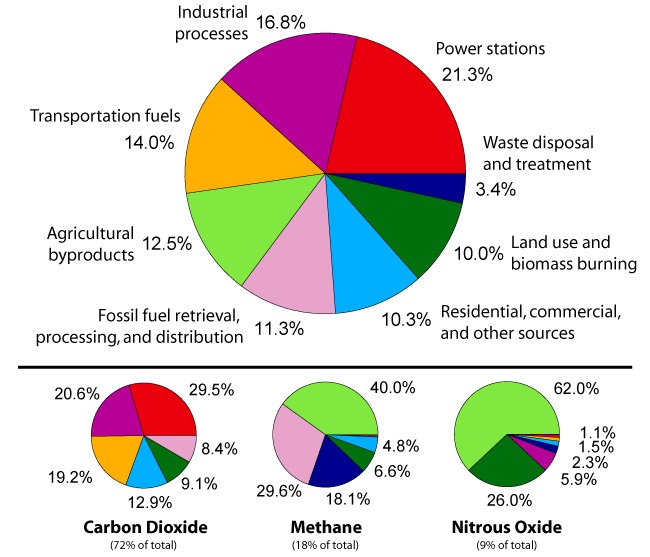
In
the Wealden district there
is not a sustainable wooden building in sight, except one at Twissells
Mill, that had to go to Appeal to the Secretary of State, to save a timber
mobile cabin from demolition. Where, one would expect
to see affordable units springing up to plug the housing shortage and
reduce long-term carbon footprints.
Property developers have been keen to jump on what looks like a building boom. Once
again, not providing any genuinely affordable housing as per the test,
being low enough in cost that an agricultural worker might afford to get
on the property ladder. Not that this concerns the plight of
Herstmonceux Museum in the main.
But, we must think about the long term ramifications of policies that do
not accord with the Paris Agreement of 2015 - that are raising the
temperatures of English summers, and so threatening the timber building.
And anyone can see
local policies are not
working, but rather sliding backwards to an eco hell. And what is
happening locally, is happening nationally and internationally. Everyone
will be taking it to the edge. Towns will burn, like in Canada, until
councillors start sitting up and doing what they should be doing. By
which time it will be too late. Hence, trying to grab a few more bucks
on the way to the cemetery, will not stop the thermal holocaust they
have created. At which point money for enhanced pensions means doody
squat.

KYOTO
PROTOCOL, JAPAN 1997
On December 11, 1997, delegates from more than 150 countries signed the Kyoto Protocol, an agreement to lower the amount of greenhouse gases released into the atmosphere.
Countries that
signed and ratified the Kyoto Protocol are legally bound to reduce their greenhouse gas emissions by an agreed amount.
Under this agreement, the UK reduction target was -12.5% on base-year levels. The first commitment period of the Kyoto Protocol was from 2008 to 2012.
The second commitment period of the Kyoto Protocol applies from 2013 to 2020 inclusive. For this second commitment period, the EU and the Member States communicated an independent quantified economy-wide emission reduction target of a 20 percent emission reduction by 2020 compared with 1990 levels (base year) (“the EU2020 target”).
The Climate Change Act became
Law in the United Kingdom on the 26th November 2008. This legislation introduced a new, more ambitious and legally binding target for the UK to reduce GHG emissions to 80% below base year by 2050, with legally binding five year GHG budgets.
The Climate Change Act was amended in 2019 to revise the
greenhouse gas emission reduction target for 2050 from 80% to 100%, i.e.
net-zero.
Countries that signed and ratified the Paris Agreement are asked to declare a Nationally Determined Contribution
(NDC), where countries set out what targets they intend to meet to contribute to mitigating climate change, and information on how the country plans to achieve those targets. The UK’s NDC commits the UK to reducing economy-wide greenhouse gas emissions by at least 68% by 2030, compared to 1990 levels.
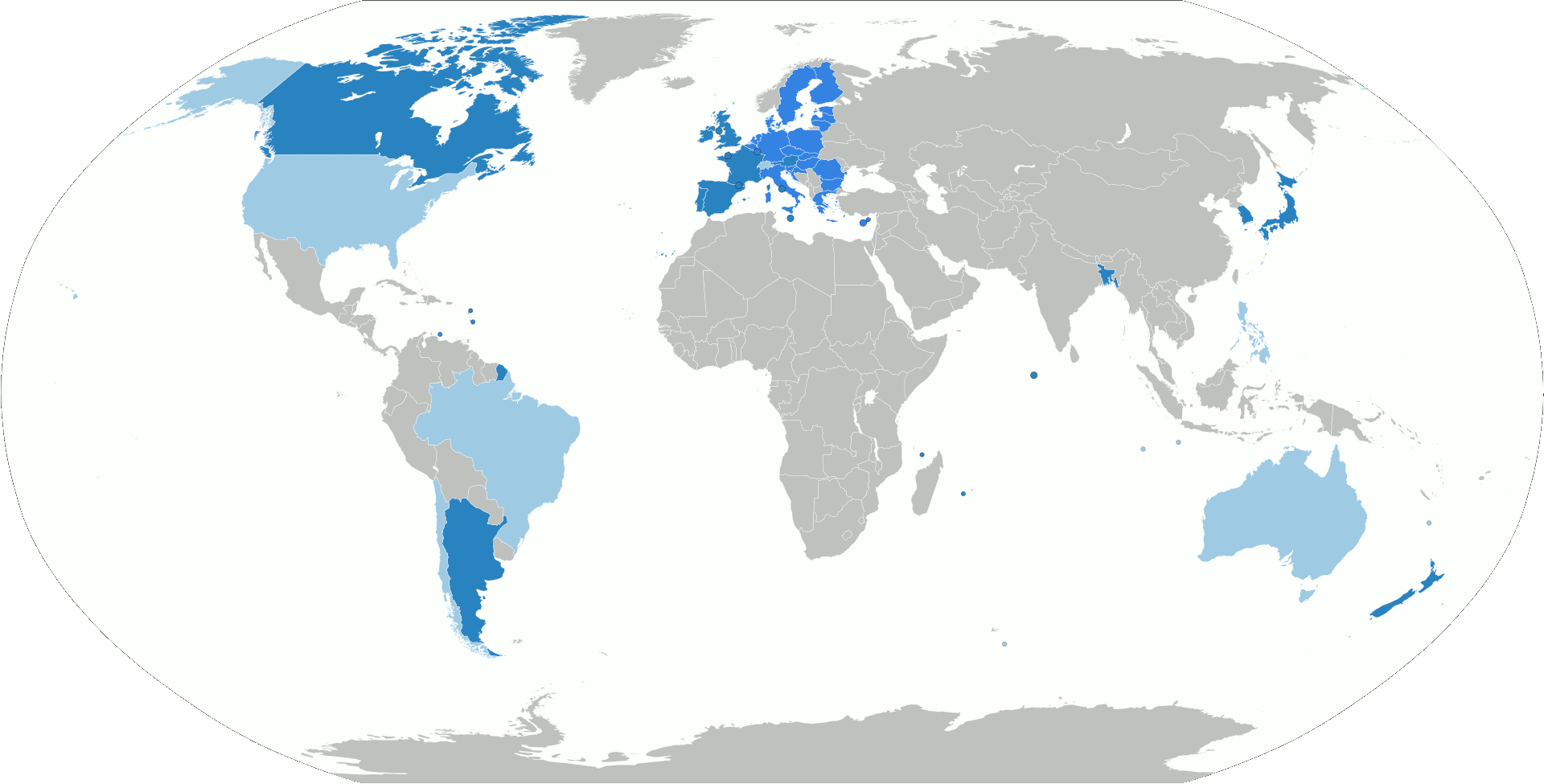

WORLD
DECLARATIONS
A climate emergency declaration or declaring a climate emergency is an action taken by governments and scientists to acknowledge humanity is in a climate crisis.
The first such declaration was made by a local government in December 2016. Since then over 2,100 local governments in 39 countries have made climate emergency declarations As of May 2022. Populations covered by jurisdictions that have declared a climate emergency amount to over 1 billion citizens.
On 29 April 2019, the Welsh Government declared a climate emergency, which was subsequently passed by its parliament, the Senedd, on 1 May 2019, when it became the first in the world to officially declare a climate emergency.
Once a government makes a declaration, the next step for the declaring government is to set priorities to mitigate climate change, prior to ultimately entering a state of emergency or equivalent. In declaring a climate emergency, a government admits that climate change (or global warming) exists and that the measures taken up to this point are not enough to limit the changes brought by it. The decision stresses the need for the government and administration to devise measures that try to stop human-caused global warming.
The declarations can be made on different levels, for example, at a national or local government level, and they can differ in depth and detail in their guidelines. The term climate emergency does not only describe formal decisions, but also includes actions to avert climate breakdown. This is supposed to justify and focus the governing body towards climate action. The specific term emergency is used to assign priority to the topic, and to generate a mindset of urgency.
The term climate emergency has been promoted by climate activists and pro-climate action politicians to add a sense of urgency for responding to a long-term
problem. A United Nations Development Programme survey of public opinion in 50 countries found that sixty-four percent of 1.2 million respondents believe climate change is a global emergency.
TERMINOLOGY
Climate emergency as a term was used in protests against climate change before 2010 (e.g. the "Climate-Emergency-Rally" in Melbourne in June 2009). In 2017 the city council of Darebin adopted multiple measures named "Darebin Climate Emergency Plan". On 4 December 2018, the Club of
Rome presented their "Climate Emergency Plan", which included 10 high-priority measures to limit global warming. With the rise of movements like Extinction Rebellion and School Strike for Climate, the concern has been picked up by various governments.
Multiple European cities and communities who declared a climate emergency are simultaneously members of the Klima-Bündnis (German for climate alliance), which obligates them to lower their CO2 emissions by 10% every five years.
Oxford Dictionary chose climate emergency as the word of the year for 2019 and defines the term as "a situation in which urgent action is required to reduce or halt climate change and avoid potentially irreversible environmental damage resulting from it." Usage of the term soared more than 10,000% between September 2018 and September 2019.
EARLY STAGES
Encouraged by the campaigners behind a Climate Emergency Declaration petition, which had been launched in Australia in May 2016, the first governmental declaration of a climate emergency in the world was put forward by Trent McCarthy, an Australian Greens Councillor at the City of Darebin in Melbourne, Australia. The city declared a climate emergency on 5 December 2016. In August 2017, Darebin decided upon a catalogue of actions in a "Darebin Climate Emergency Plan". Darebin's declaration was followed by Hoboken in New Jersey and Berkeley,
California.
Hearing of these developments in 2018, UK Green Party politician Carla Denyer, then a member of Bristol City Council, took the lead role in bringing about Bristol City Council's declaration of a climate emergency. This was the first such declaration
in Europe, and has been widely credited as a breakthrough moment for cities and national parliaments beginning to declare climate emergency. Denyer's motion was described in the UK newspaper The Independent as 'the historic first motion' which by July 2019 had been 'copied by more than 400 local authorities and parliaments'.
On 28 April 2019, Nicola Sturgeon, First Minister of the Scottish Government, declared a climate emergency at the SNP conference; the Climate Change (Emissions Reduction Targets) (Scotland) Act was passed on 25 September 2019. The following day, the Welsh Government declared a climate emergency, which was subsequently passed by its parliament, the Senedd, on 1 May 2019, when it became the first in the world to officially declare a climate emergency. The Parliament of the United Kingdom followed later that afternoon.
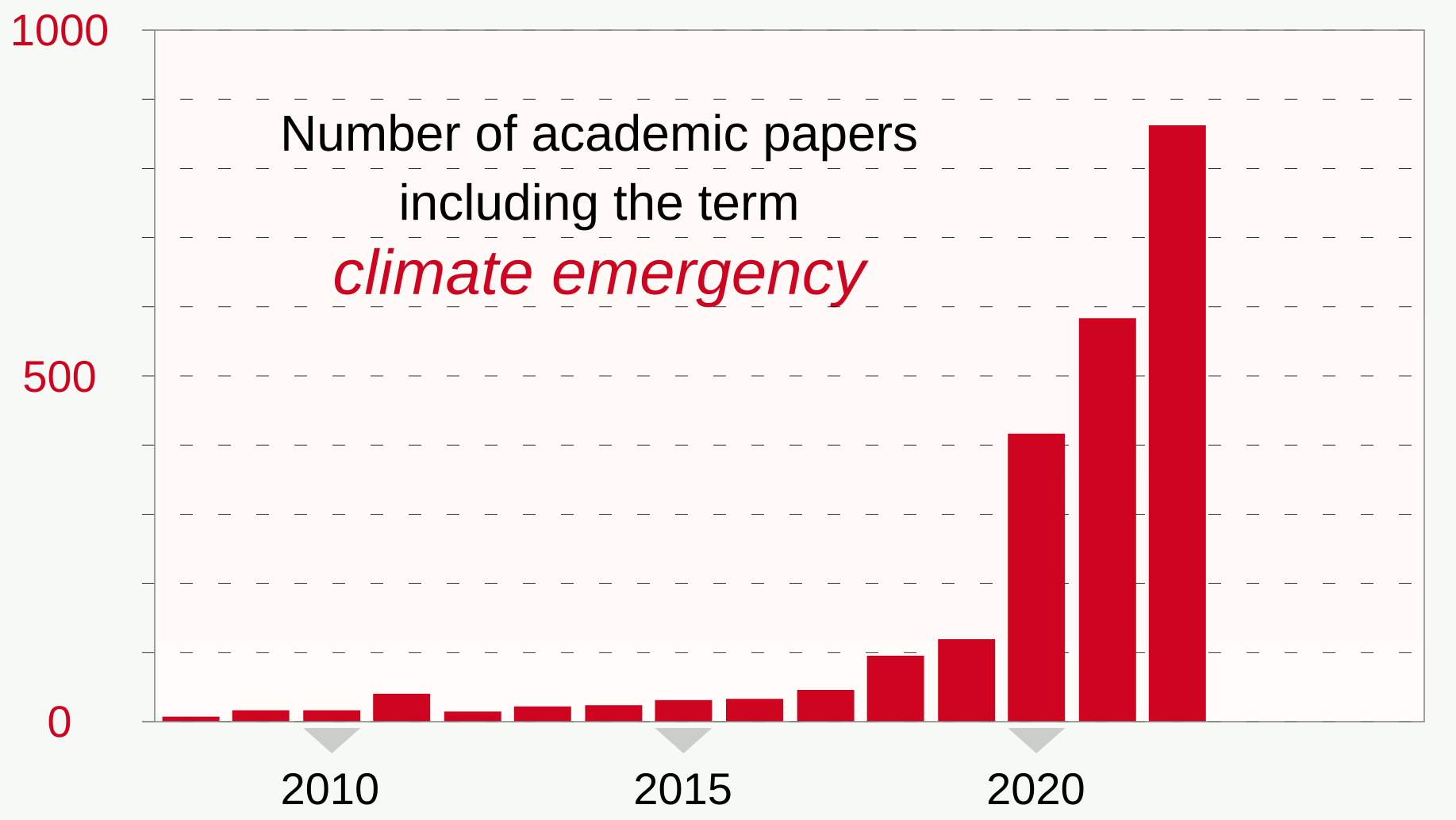
SUBSEQUENT DEVELOPMENTS
Pope Francis declared a climate emergency in June 2019. The Pope also called for a "radical energy transition" away from fossil fuels towards renewable energy sources, and urged leaders to "hear the increasingly desperate cries of the earth and its poor." He also argued against "the continued search for new fossil fuel reserves" and stated that
"fossil fuels should remain underground."
On 10 July 2019, networks representing more than 7,000 higher and further education institutions from six continents announced that they are declaring a Climate Emergency, and agreed to undertake a three-point plan to address the crisis through their work with students. Some statements were criticized for not including specific measures.
In June 2019, Councillor Trent McCarthy of the City of Darebin brought together councillors and parliamentarians in Australia and around the world for two online link-ups to connect the work of climate emergency-declared councils and governments. Following these link-ups and a successful motion at the National General Assembly of Local Government, McCarthy announced the formation of Climate Emergency Australia, a new network of Australian governments and councils advocating for a climate emergency response.
Representative Earl Blumenauer of Oregon believes the US government should declare a climate emergency. Blumenauer's proposed legislation is supported by 2020 US presidential candidate and Senator Bernie Sanders, as well as Congresswoman Alexandria Ocasio-Cortez.
In 2019, according to an eight-country poll, a majority of the public recognise the climate crisis as an "emergency" and say politicians are failing to tackle the problem, backing the interests of Big Oil over the wellbeing of ordinary people. The survey found that climate breakdown is viewed as the most important issue facing the world in seven out of the eight countries surveyed.
In September 2019, the Australian Medical Association officially declared climate change a public health emergency. The AMA noted that climate change will cause "higher mortality and morbidity from heat stress, injury and mortality from increasingly severe weather events; increases in the transmission of vector-borne diseases; food insecurity resulting from declines in agricultural outputs; [and] a higher incidence of mental-ill health." The AMA has called on the Australian Government to adopt a carbon budget; reduce emissions; and transition from fossil fuels to renewable energy, among other proposals to mitigate the health impacts of climate change. Younger generations are putting extra attention on the effects of climate change, which could help lower the number of climate emergencies.
The Australian Greens Party have called on the federal Parliament to declare a climate emergency. Greens MP for
Melbourne, Adam Bandt, welcomed the UK Parliament's declaration of a climate emergency and argued that
Australia should follow their lead. In October 2019, an official e-petition to the Australian Parliament calling for the declaration of a climate emergency, received more than 400,000 signatories. This is the single most popular online Parliamentary petition in Australia. Former federal Liberal Party leader John Hewson has publicly urged for a conscience vote in the Parliament on the climate emergency, despite the Liberal Party's current position on climate change. He also stated that "it was an emergency 30 years ago".
In October 2019, the Australian Labor Party supported the Greens Party's policy to declare a climate emergency, however the proposition failed with the rejection of the Morrison Government. The motion was supported by independent members Zali Steggall, Helen Haines and Andrew Wilkie, as well as Centre Alliance.
On 5 November 2019, the journal BioScience published an article endorsed by further 11,000 scientists from 153 nations, that states Climate Emergency ("We declare clearly and unequivocally that planet Earth is facing a climate emergency") and that the world's people face "untold suffering due to the climate crisis" unless there are major transformations to global society. On 28 July 2021, BioScience published another article, stating, that more than 2,800 additional scientists have signed that declaration; and that in addition, 1,990 jurisdictions in 34 countries have formally declared or recognized a climate emergency.
In November 2019, the Oxford Dictionaries made the term climate emergency word of the year.
On 14–15 February 2020 the first National Climate Emergency Summit was held at the city hall in Melbourne, Australia. It was a sold-out event with 2,000 attendees and 100 speakers.
In December 2020, New Zealand declared a climate emergency. After winning reelection, Prime Minister Jacinda Ardern's majority Labour government invited the Greens to participate in a "cooperation agreement", and worked with the Minister for Climate James Shaw in declaring a climate emergency.
As of December 2020, five years after the Paris Agreement, at least 15 countries have already declared a state of climate emergency, including Japan and New Zealand. (Note: The fact that councils in 34 countries have declared is not the same as that these countries' national governments have declared.) The Secretary-General of the United Nations
António Guterres has urged all other countries to declare climate emergencies until carbon neutrality is reached. Due to the COVID-19 Pandemic, health care workers have put less effort into planetary wellness, which will put more of a strain on the Earth leading to more climate emergencies.
In September 2021, Mauritius joined the list of countries calling for a State of Climate Emergency. The recommendation was made by the National Youth Environment (NYEC) Chairperson, Dr. Zaheer Allam, and announced by the Environment Minister, Kavy Ramano, after the first sitting of the Interministerial Council on Climate Change. A novel approach has been introduced which involves analyzing past society's and how they have dealt with other types of disasters.
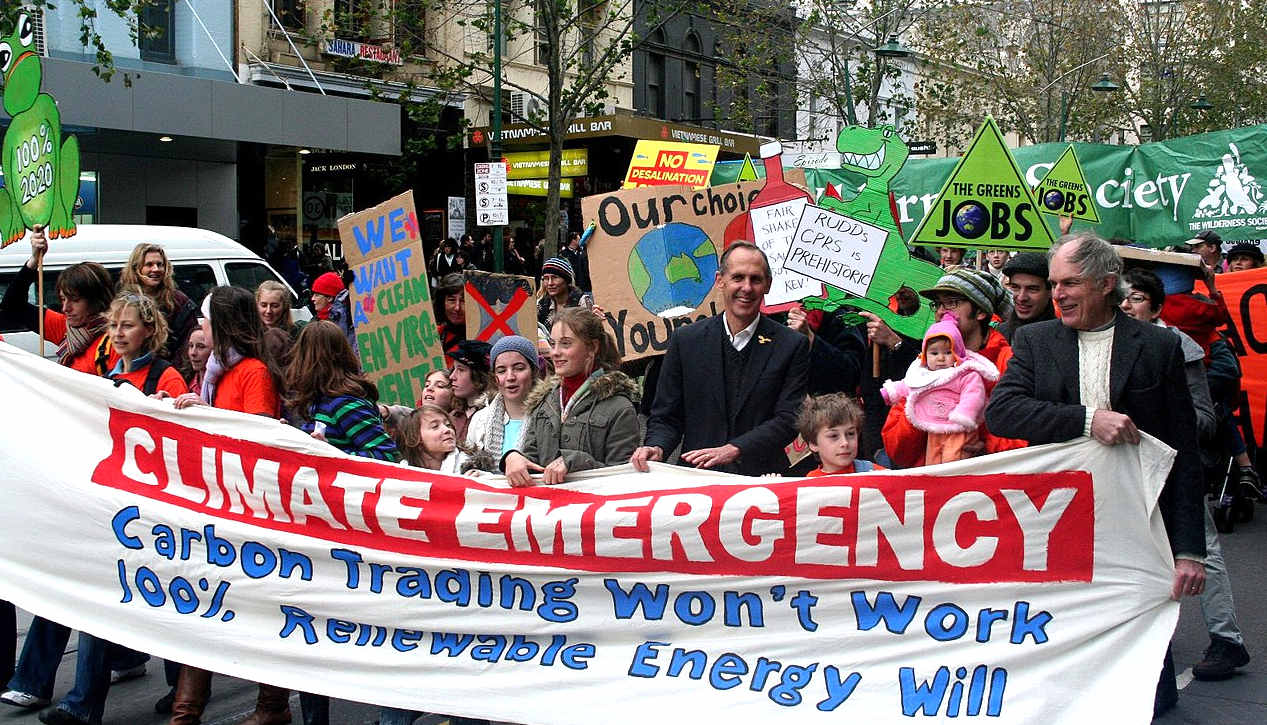
PARLIAMENTARY OR GOVERNMENT
DECLARATIONS
Scotland (28 April 2019 – Nicola Sturgeon)
Wales (29 April 2019 – Parliament)
United Kingdom (1 May 2019 – Parliament)
Jersey (2 May 2019)
Republic of Ireland (9 May 2019)
Isle of Man (10 May 2019 – Government, 18 June 2019 – Parliament)
Portugal (7 June 2019)
Holy See (June 2019)
Canada (17 June 2019)
France (27 June 2019)
Argentina (17 July 2019)
Spain (17 September 2019 – Parliament, 21 January 2020 – Government)
Austria (25 September 2019)
Malta (22 October 2019)
Bangladesh (13 November 2019)
Italy (12 December 2019)
Andorra (23 January 2020)
Maldives (12 February 2020)
South Korea (24 September 2020)
Japan (20 November 2020)
New Zealand (2 December 2020)
Singapore (1 February 2021)
Hawaii (29 April 2021 – State Legislature)
Mauritius (28 September 2021)
EUROPEAN MEMBER STATES
On 28 November 2019, the European Parliament declared a climate emergency. The EU represented at that date 28 member states: Austria, Belgium, Bulgaria, Croatia, Cyprus, Czech Republic, Denmark, Estonia, Finland, France, Germany, Greece, Hungary, Ireland, Italy, Latvia, Lithuania, Luxembourg, Malta, Netherlands, Poland, Portugal, Romania, Slovakia, Slovenia, Spain, Sweden and the United Kingdom.
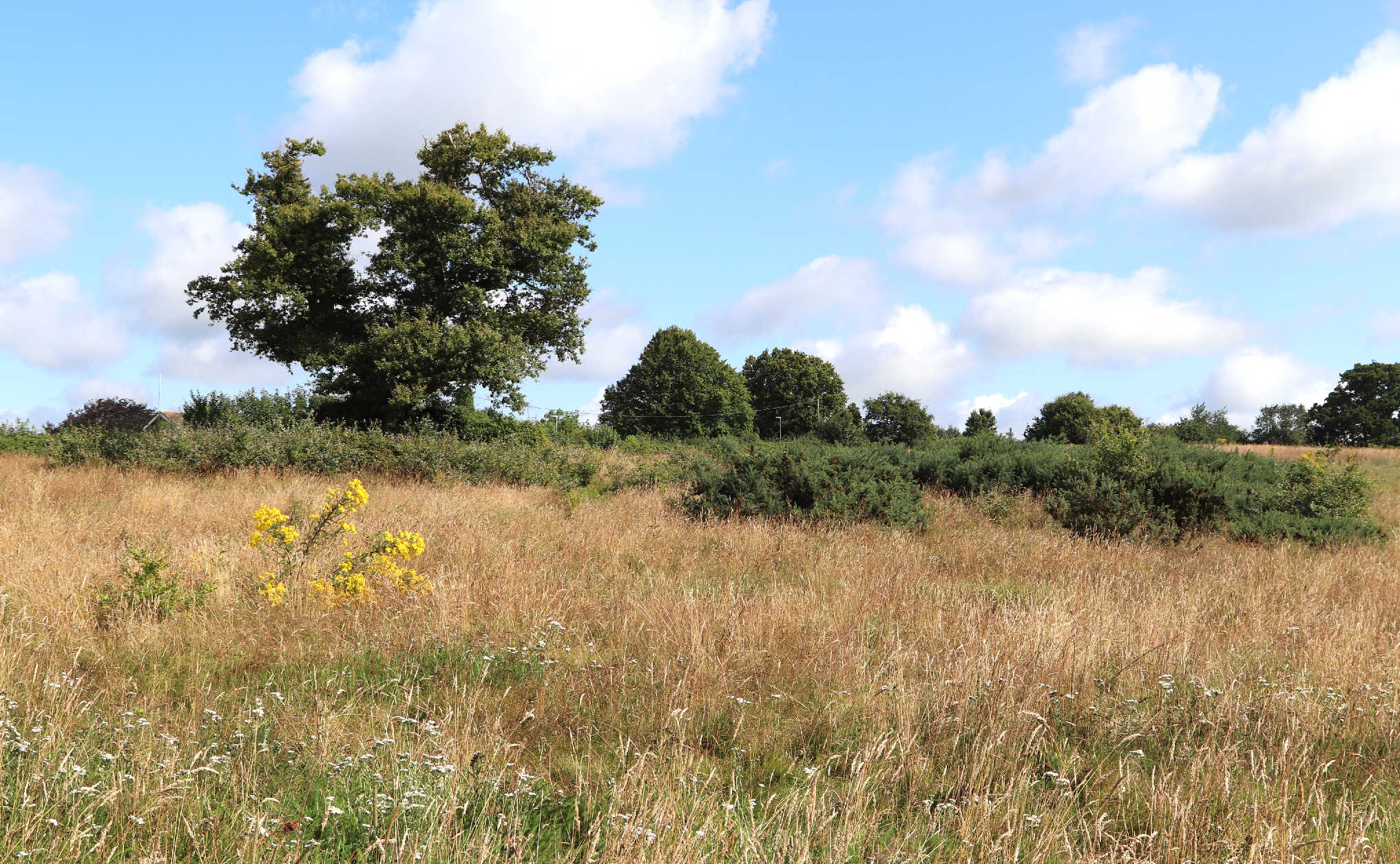
Now
that is what we call rewilding. The oak tree in the middle of this
field, and others dotted around the perimeter have been seeding rather
well. The tall grass and other shrubs are providing homes for much
wildlife. The hope is that, apart from footpaths and historic rights of
way, that this becomes a focal point for family walks, ramblers, hikers
and dog walkers in the village of Herstmonceux.
SOLAR
PANELS
As
with the use of timber, energy bills can be reduced, hence carbon
footprints, in installing solar
panels, that are now economical and
significantly reduce the cost of operating the Museum complex. Also
cutting emissions from greenhouse gases, when totally reliant on fossil
fuels for electricity
generation.
REWILDING
Rewilding can mitigate global
climate change by restoring ecosystems. An example of this would be rewilding pasture land, thereby reducing the number of cows and sheep and increasing the number of trees.
PLANTING TREES
Planting trees is the most efficient and scalable nature-based solution to fighting climate change and helping to achieve the Paris Agreement targets of restricting global warming to 1.5°C. Forests have great potential to help absorb more of the excess carbon dioxide (CO2) in the atmosphere as trees absorb it and store as carbon, making forests the largest land based carbon sink. Preserving and restoring forests is internationally recognised as being essential to helping fight
climate
change, but there is a surprising way that trees could help store more carbon, by cutting them down.
Although all plant matter absorbs carbon dioxide from the atmosphere, trees sequester (absorb and store) some of the carbon in their trunk, potentially storing it for hundreds of years. Uniquely the wood itself continues to act as a carbon store after the tree is felled and the timber is used in construction or the manufacture of furniture. Using timber in construction also reduces the carbon footprint of buildings compared to other building materials, meaning that wood offers great potential to revolutionise the greenhouse gas emissions of the construction industry.
SUSTAINABLE BUILDING
There is pressure on the construction industry to find alternative building materials because cement and concrete production account for 8% of global greenhouse gas emissions and the global iron and steel industry account for another 5%. It is estimated that half a tonne of CO2 is emitted to manufacture 1 tonne of concrete, and 2 tonnes of CO2 are emitted in the manufacture of 1 tonne of
steel. Wood is increasingly being considered as a viable alternative in both residential and larger building projects as it is the ultimate renewable material with multiple benefits for reducing carbon.
Firstly, the use of timber reduces the embodied carbon in a building, i.e. the
carbon footprint of the building’s creation, because there are lower emissions associated with its production.
Timber also acts as a carbon sink because it preserves the carbon that is stored in the wood, preventing its release back into the atmosphere as carbon dioxide. Sustainable forestry practices can ensure that felled trees are replaced and that new growing trees will continue to absorb
carbon
dioxide, increasing the carbon sequestration potential. If buildings are designed so that the disassembly and recycling of materials is incorporated into the initial plan, then the timber can be further reused. Any timber has these benefits that combine to make it a renewable source of material, but engineered
wood products extend the capabilities and carbon sequestration potential of timber even further.

Timber
is versatile, recyclable and beautiful. A construction material working
with nature.
THE
KING'S SPEECH 17 JULY 2024
My Lords and Members of the House of
Commons, My Government will govern in service to the country.
My Government’s legislative programme will be mission led and based upon the principles of security, fairness and opportunity for all.
Stability will be the cornerstone of my Government’s economic policy and every decision will be consistent with its fiscal rules. It will legislate to ensure that all significant tax and spending changes are subject to an independent assessment by the Office for Budget Responsibility [Budget Responsibility Bill]. Bills will be brought forward to strengthen audit and corporate governance, alongside pension investment [Draft Audit Reform and Corporate Governance Bill, Pension Schemes Bill].
Securing economic growth will be a fundamental mission. My Government will seek a new partnership with both business and working people and help the country move on from the recent cost of living challenges by prioritising wealth creation for all communities. My Ministers will establish an Industrial Strategy Council. It is my Government’s objective to see rising living standards in all nations and regions in the United Kingdom.
My Ministers will get Britain building, including through planning reform, as they seek to accelerate the delivery of high quality infrastructure and housing [Planning and Infrastructure Bill]. They will also pursue sustainable growth by encouraging investment in industry, skills and new technologies.
My Government is committed to making work pay and will legislate to introduce a new deal for working people to ban exploitative practices and enhance employment rights [Employment Rights Bill]. It will seek to establish the appropriate legislation to place requirements on those working to develop the most powerful artificial intelligence models.
My Government believes that greater devolution of decision making is at the heart of a modern dynamic economy and is a key driver of economic growth and my Ministers will introduce an English Devolution Bill [English Devolution Bill]. Legislation will be introduced to give new powers to metro mayors and combined authorities. This will support local growth plans that bring economic benefit to communities.
A Bill will be introduced to allow local leaders to take control of their local bus services [Better Buses Bill]. My Ministers will bring forward legislation to improve the railways by reforming rail franchising, establishing Great
British Railways and bringing train 8 operators into public ownership [Passenger Railway Services (Public Ownership) Bill, Rail Reform Bill].
Taken together these policies will enhance Britain’s position as a leading industrial nation and enable the country to take advantage of new opportunities that can promote growth and wealth creation.
My Government recognises the urgency of the global climate challenge and the new job opportunities that can come from leading the development of the technologies of the future. It is committed to a clean energy transition which will lower energy bills for consumers over time. A Bill will be introduced to set up Great British Energy, a publicly owned clean power company headquartered in Scotland, which will help accelerate investment in
renewable energy such as offshore
wind [Great British Energy Bill]. Legislation will be brought forward to help the country achieve energy independence and unlock investment in energy infrastructure. A Bill will be introduced to support
sustainable aviation fuel production [Sustainable
Aviation Fuel (Revenue Support Mechanism) Bill]. My Government recognises the need to improve water quality and a Bill will be introduced to strengthen the powers of the water regulator
[Water (Special Measures) Bill].
My Government will seek to strengthen the border and make streets safer. A Bill will be introduced to modernise the asylum and immigration system, establishing a new Border Security Command and delivering enhanced counter terror powers to tackle organised immigration crime [Border Security, Asylum and Immigration Bill]. Legislation will be brought forward to strengthen community policing, give the police greater powers to deal with anti social behaviour and strengthen support for victims [Crime and Policing Bill, Victims, Courts and Public Protection Bill].
Measures will be introduced to improve the safety and security of public venues and help keep the British public safe from terrorism [Terrorism (Protection of Premises) Bill]. My Government will bring forward plans to halve violence against women and girls.
My Ministers will seek to raise educational standards and break down barriers to opportunity. Action will be taken to get people back in employment following the impact of the pandemic. A Bill will be introduced to raise standards in education and promote children’s wellbeing [Children’s Wellbeing Bill]. Measures will be brought forward to remove the exemption from Value Added Tax for private school fees, which will enable the funding of six and a half thousand new teachers. My Government will establish Skills England which will have a new partnership with employers at its heart [Skills England Bill], and my Ministers will reform the apprenticeship levy.
Legislation will be introduced to give greater rights and protections to people renting their homes, including ending no fault evictions and reforming grounds for possession
[Renters’ Rights Bill]. Draft legislation will be published on leasehold and commonhold reform [Draft Leasehold and Commonhold Reform Bill].
A Bill will be introduced to establish an independent football regulator to ensure greater sustainability in the game and strengthen protections for fans [Football Governance Bill].
My Government will improve the National Health Service as a service for all, providing care on the basis of need regardless of the ability to pay. It will seek to reduce the waiting times, focus on prevention and improve mental health provision for young people. It will ensure mental health is given the same attention and focus as physical health. My ministers will legislate to modernise the Mental Health Act so it is fit for the twenty first century [Mental Health Bill]. A Bill will be introduced to progressively increase the age at which people can buy cigarettes and impose limits on the sale and marketing of vapes [Tobacco and Vapes Bill]. My Ministers will also legislate to restrict advertising of junk food to children along with the sale of high caffeine energy drinks to children. A draft Bill will be brought forward to ban conversion practices [Draft Conversion Practices Bill].
My Government will take steps to help rebuild trust and foster respect. Legislation will be brought forward to introduce a duty of candour for public servants [Hillsborough Law]. A Bill will be introduced to establish a statutory Armed Forces Commissioner to act as a strong independent champion for our gallant Armed Forces and their families [Armed Forces Commissioner Bill].
Legislation on race equality will be published in draft to enshrine the full right to equal pay in law [Draft Equality (Race and Disability) Bill].
My Government will strengthen its work with the devolved governments in Scotland,
Wales and Northern Ireland so that the best outcomes possible are delivered for citizens across the United Kingdom. My Ministers will establish a new Council of the Nations and Regions to renew opportunities for the Prime Minister, heads of devolved governments and mayors of combined authorities to collaborate with each other.
My Government will continue to support the political institutions and devolved government in Northern
Ireland. In consultation with all parties, measures will be brought forward to begin the process of repealing and replacing the Northern Ireland Troubles (Legacy and Reconciliation) Act 2023 [Northern Ireland Legacy Legislation].
Measures to modernise the constitution will be introduced including House of Lords reform to remove the right of hereditary peers to sit and vote in the Lords
[House of Lords (Hereditary Peers) Bill]. My ministers will strengthen the integrity of elections and encourage wide participation in the democratic process.
The Government will propose a modernisation committee of the House of Commons which will be tasked with driving up standards, improving work practices and reforming procedures.
My Government will ensure a strong defence based on the North Atlantic Treaty Organisation’s common values of individual liberty, democracy,
human rights and the rule of law. Its commitment to NATO will remain unshakeable. It will maintain a strong Armed Forces, including the nuclear deterrent. To ensure that the United Kingdom’s defence capabilities are matched to the changing nature of global strategic threats, my Government will conduct a Strategic Defence Review.
My Government will continue to give its full support to Ukraine and its people and it will endeavour to play a leading role in providing
Ukraine with a clear path to
NATO membership.
My Government will seek to reset the relationship with European partners and work to improve the United Kingdom’s trade and investment relationship with the European Union. My Ministers will seek a new security pact to strengthen cooperation on the mutual threats faced by the
United Kingdom and the European Union.
My Government will play its part in trying to secure long term peace and security in the Middle East. It is committed to a two state solution with a safe and secure Israel alongside a viable and sovereign Palestinian state.
Later this week, my Government will host the European Political Community meeting at Blenheim Palace. The Queen and I look forward to our Visit to
Samoa alongside the Commonwealth Heads of Government Meeting in October, and our Visit to
Australia.
Members of the House of Commons
Estimates for the public services will be laid before you.
My Lords and Members of the House of Commons
Other measures will be laid before you.
I pray that the blessing of Almighty God may rest upon your counsels.

KING
CHARLES - PRO REWILDING & RENEWABLES
In
The King’s Speech
on the 17th July 2024, important first steps were taken to deliver the new UK Government’s agenda for nature and climate. Advanced renewable energy provision and tackling the cavalier, profit-maximalist approach by
water companies that has resulted in four in five of our waterways not being in good ecological condition are front and centre of the plans. And yet, with no nature-focused bill, there is an almost complete lack of priority given to the vital role of nature’s restoration at scale in our nation’s future.
In the UK we now have a huge opportunity to integrate our responses to the climate and nature emergencies and for the Labour government, in cooperation with the devolved administrations, to lead the way on this.
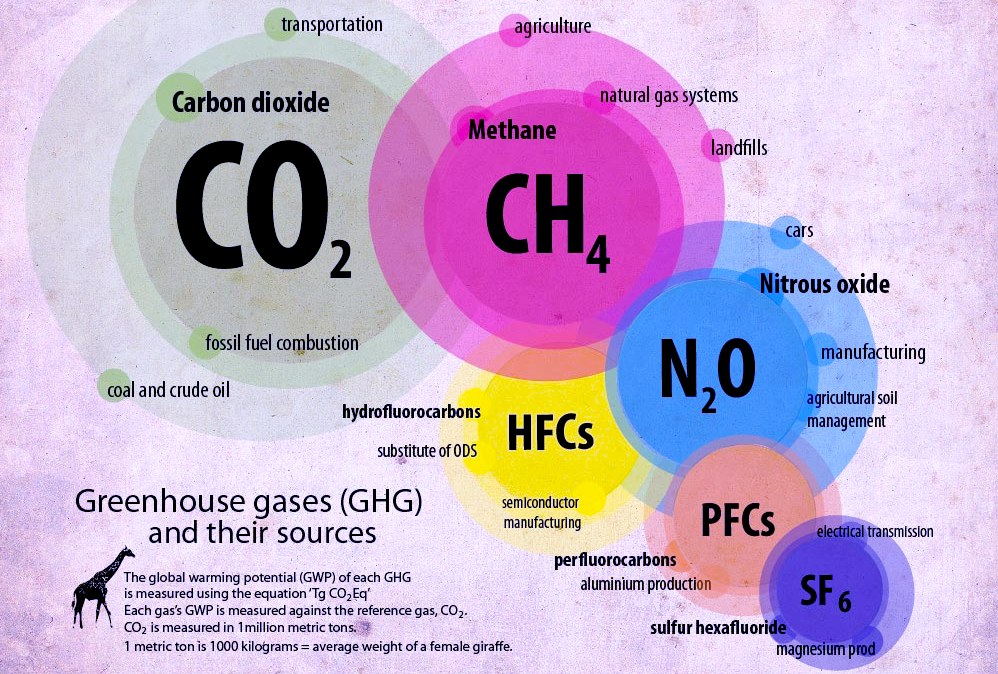
MAKING
THE LINK BETWEEN GLOBAL WARMING AND POLICIES
The Labour government’s emphasis on a green energy transition and creating good jobs in the industrial heartlands is exciting and progressive.
To deliver a truly
green economy we need to also consider the importance of a green land and marine use transition.
Agriculture alone currently produces 10% of the UK’s
greenhouse
gases. We know that rewilding 30% of Britain could help reverse that. It could sequester up to 53 million tonnes of CO2/year – equivalent to 12% of our current emissions – and make a significant contribution to achieving
net zero.
By switching to renewables we might save the planet from the perils of fossil
fuels.
We
hope that these guiding principles as to tackling climate change, coupled
with our technological exhibits might inspire generations of young
scientists, and conservationists to think outside the box, as the innovators appear to have come up with
some quite remarkable solutions, all in one geographical location. As some kind of
spontaneous think tank, inventive Mecca, or creative commune, where ideas
come to life. There is no reason you cannot do the same. Provided
the State nurtures such talent. The first step of which is recognising
the innovators in their midst, then assisting, rather than hindering
such creativity. Mostly, creative people are seen as a threat, because
they do not conform. Yet, conformity stifles creativity.
















